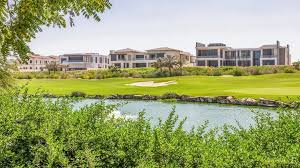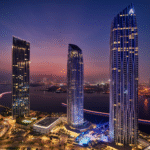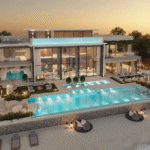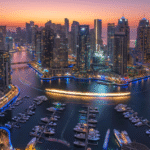Now Reading: Why Dubai Remains a Top Destination for Luxury Property Owners
-
01
Why Dubai Remains a Top Destination for Luxury Property Owners
Why Dubai Remains a Top Destination for Luxury Property Owners
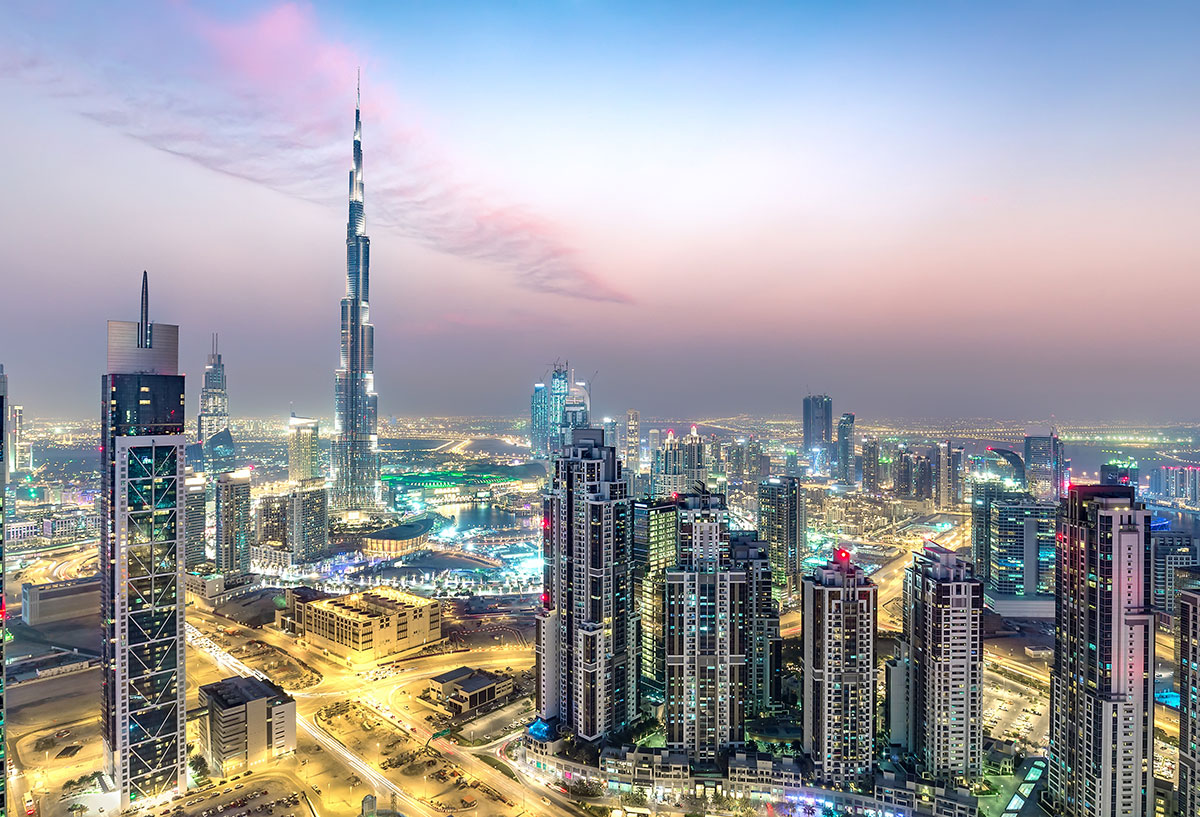
Table of Contents
Top Destination: Imagine sipping coffee on a private terrace, gazing at the Burj Khalifa’s shimmering silhouette, knowing your home is not just a sanctuary but a thriving investment in one of the world’s most glamorous cities. In 2025, Dubai’s luxury property market is soaring, with 96,000 transactions worth $87 billion in the first half, 58% driven by buyers from the UK, India, Russia, and China. Iconic areas like Palm Jumeirah, Downtown Dubai, and Emirates Hills offer 100% freehold ownership, a dirham pegged to the U.S. dollar, and no personal income tax, capital gains tax, or annual property taxes.
With 6-9% rental yields and 7-15% price appreciation, these properties outshine London (2-4%) and New York (2-3%). Properties over $545,000 qualify for a 10-year Golden Visa, while smaller units grant 2-year residency. Fueled by 25 million tourists and a 4% population surge, Dubai’s luxury homes blend opulent lifestyles with strong returns. Navigating fees, VAT, and 2025 regulations is key to securing your place in this elite paradise.
Why Dubai’s Luxury Properties Are Unrivaled
Located 15-40 minutes from Dubai International Airport via Sheikh Zayed Road or water taxis, these communities offer villas, penthouses, and apartments with vacancy rates of 2-3%, compared to 7-10% globally. You keep 100% of rental income $36,000-$150,000 annually on $600,000-$5 million properties versus $19,800-$90,000 elsewhere after taxes.
Zero capital gains tax saves $30,000-$300,000 on $150,000-$1.5 million profits, and no property taxes save $6,000-$50,000 yearly, unlike London’s council tax (up to 2%) or New York’s property tax (1-2%). Residential purchases skip 5% VAT ($30,000-$250,000), and the Golden Visa adds residency value. With private beaches, marinas, and proximity to Burj Al Arab, these properties deliver 7-15% price growth, offering unmatched luxury and investment potential.
Living here feels like stepping into a world of effortless glamour.
No Personal Income Tax: Rentals That Spark Wealth
Dubai imposes no personal income tax, letting you keep every dirham, unlike the U.S. (up to 37%) or UK (up to 45%). A $600,000 Downtown Dubai apartment yields $36,000-$54,000, saving $13,320-$24,300; a $5 million Palm Jumeirah villa yields $120,000-$150,000, saving $54,000-$67,500. Short-term rentals, driven by 25 million tourists visiting Dubai Mall or Ain Dubai, require a DTCM license ($408-$816), boosting yields by 10-20% ($3,600-$30,000). Long-term leases, popular with affluent expats, need Ejari registration ($54-$136) for stability. Non-compliance risks fines up to $13,612, so licensing is essential. Smart home systems and AI-driven pricing tools maximize profits in these high-demand areas.
Tax-free rentals feel like a monthly wave of prosperity.
Zero Capital Gains Tax: Profits That Soar
Dubai’s luxury properties offer zero capital gains tax, letting you keep 100% of sale profits. Selling a $600,000 Emirates Hills apartment for $720,000 (20% appreciation) yields a $120,000 tax-free profit, saving $24,000-$33,600 versus London (20-28%) or New York (20-37%). A $5 million Palm Jumeirah villa sold for $6.25 million delivers a $1.25 million tax-free gain, saving $250,000-$350,000. Price growth varies: 10-15% in Palm Jumeirah, 7-12% in Downtown Dubai and Emirates Hills. A 4% DLD fee ($24,000-$200,000), often split, applies, but tax-free profits make these properties wealth-building havens.
Keeping every dirham feels like a financial triumph.
No Annual Property Taxes: Ownership That Feels Light
Unlike global markets, Dubai has no annual property taxes, saving $6,000-$50,000 yearly on $600,000-$5 million properties versus London’s council tax ($12,000-$100,000) or New York’s property tax (1-2%). Maintenance fees range from $8,000-$25,000, covering premium amenities like private pools or golf courses, competitive with global luxury markets. A 5% municipality fee on rentals ($1,800-$7,500) applies, reasonable for elite locations. These costs make ownership sustainable, supporting a glamorous lifestyle.
No property taxes feel like a warm embrace for your investment.
VAT Rules: A Savvy Investor’s Advantage
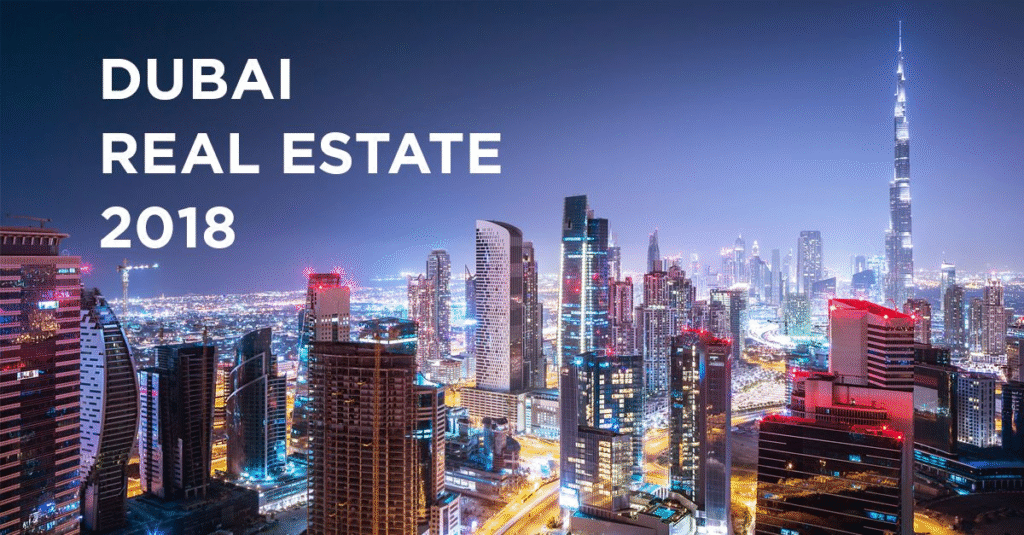
Residential purchases skip 5% VAT, saving $30,000-$250,000 on $600,000-$5 million properties, unlike commercial properties or the UK’s stamp duty (up to 12%, or $72,000-$600,000). Off-plan purchases, common in Downtown Dubai, incur 5% VAT on developer fees ($6,000-$100,000), recoverable via Federal Tax Authority (FTA) registration ($500-$1,000). Short-term rental operators must register for VAT if revenue exceeds $102,041, charging 5% but claiming credits on DTCM fees ($408-$816). A $600,000 apartment yielding $36,000-$54,000 incurs $1,800-$2,700 in VAT, with $600-$1,200 in credits; a $5 million villa yielding $120,000-$150,000 incurs $6,000-$7,500 in VAT, with $2,000-$3,000 in credits. Non-compliance risks fines up to $13,612, so meticulous records are crucial.
VAT exemptions feel like a clever lift for your profits.
DLD Fees and Title Deeds: Securing Your Luxury Haven
The 4% DLD fee, typically split, applies: $24,000 for a $600,000 apartment or $200,000 for a $5 million villa. Gift transfers to family or shareholders reduce DLD to 0.125%, saving $23,250-$193,750. For example, gifting a $5 million villa cuts DLD from $200,000 to $6,250.
Title deed issuance costs $136-$272, requiring DLD registration. Broker fees, typically 2% ($12,000-$100,000), may be waived for off-plan projects like Burj Al Arab Views. Mortgage registration (0.25% of the loan, or $1,500-$12,500) and valuation fees ($680-$1,360) apply for financed deals. The 2025 Oqood system ensures escrow compliance for off-plan purchases, protecting your investment.
Title deeds feel like the key to your opulent sanctuary.
Corporate Tax: A Business Buyer’s Note
The 9% corporate tax, introduced in 2023, applies to businesses with profits over $102,110. A company leasing a $600,000 apartment yielding $36,000-$54,000 faces a 9% tax ($3,240-$4,860), reducing net income to $32,760-$49,140. A $5 million villa yielding $120,000-$150,000 incurs $10,800-$13,500 in tax. Qualified Free Zone Person (QFZP) status in areas like Dubai Multi Commodities Centre (DMCC) avoids this, saving $6,120-$36,000, with setup costs of $2,000-$5,000. Small business relief waives corporate tax for revenues under $816,000 until December 31, 2026. Individual ownership skips this tax, ideal for most buyers.
Corporate tax feels like a wave you can easily navigate.
New Tax Rules for 2025
The Domestic Minimum Top-up Tax (DMTT), effective January 1, 2025, imposes a 15% tax on multinationals with revenues over €750 million ($793 million). Individual investors and smaller entities are unaffected, and QFZP status avoids DMTT, saving $6,120-$36,000. Cabinet Decision No. 34 refines Qualifying Investment Fund (QIF) rules, exempting corporate tax if real estate income is below 10%. A QIF earning $1 million, with $100,000 from rentals, faces 9% tax ($8,100) on 90% ($900,000). A July 2025 policy allows corporate tax deductions on fair market value depreciation, saving $1,818-$9,000 annually for a $1 million property revalued at $1.25 million.
New rules feel like a puzzle with prosperous solutions.
Top Luxury Property Destinations
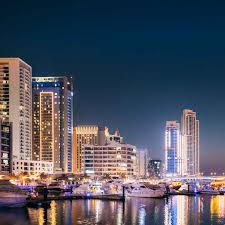
1. Palm Jumeirah: Atlantis The Royal Residences
Atlantis The Royal Residences ($600,000-$5 million) offer villas and apartments with 6-9% yields and 10-15% price growth, featuring private beaches and marina access. A $600,000 apartment yields $36,000-$54,000 tax-free, saving $13,320-$24,300. Selling for $750,000 yields a $150,000 tax-free profit, saving $30,000-$42,000. No property taxes save $6,000-$50,000, and VAT exemption saves $30,000. Maintenance fees are $8,000-$25,000, with a 5% municipality fee ($1,800-$2,700). QFZP saves $6,120-$36,000. U.S. investors deduct depreciation ($10,909-$90,909), saving up to $31,818. Its global fame draws high-net-worth buyers.
Atlantis The Royal feels like a coastal palace.
2. Downtown Dubai: Burj Al Arab Views
Burj Al Arab Views ($700,000-$4 million) offers apartments with 6-9% yields and 8-12% price growth, near Dubai Mall and Burj Khalifa. A $700,000 apartment yields $42,000-$63,000 tax-free, saving $15,540-$28,350. Selling for $840,000 yields a $140,000 tax-free profit, saving $28,000-$39,200. No property taxes save $7,000-$40,000, and VAT exemption saves $35,000. Maintenance fees are $8,000-$20,000, with a 5% municipality fee ($2,100-$3,150). QFZP saves $6,120-$36,000. U.S. investors deduct depreciation ($12,727-$72,727), saving up to $25,455. Its iconic skyline attracts professionals.
Burj Al Arab Views feels like urban grandeur.
3. Emirates Hills: Luxury Villas
Emirates Hills ($1 million-$5 million) offers villas with 6-8% yields and 7-10% price growth, featuring private pools and golf course views. A $1 million villa yields $60,000-$80,000 tax-free, saving $22,200-$36,000. Selling for $1.2 million yields a $200,000 tax-free profit, saving $40,000-$56,000. No property taxes save $10,000-$50,000, and VAT exemption saves $50,000. Maintenance fees are $10,000-$25,000, with a 5% municipality fee ($3,000-$4,000). QFZP saves $6,120-$36,000. U.S. investors deduct depreciation ($18,182-$90,909), saving up to $31,818. Its exclusivity draws elite buyers.
Emirates Hills feels like a regal estate.
4. Bluewaters Island: Bluewaters Residences
Bluewaters Residences ($600,000-$3 million) offer apartments with 7-9% yields and 8-12% price growth, near Ain Dubai. A $600,000 apartment yields $36,000-$54,000 tax-free, saving $13,320-$24,300. Selling for $720,000 yields a $120,000 tax-free profit, saving $24,000-$33,600. No property taxes save $6,000-$30,000, and VAT exemption saves $30,000. Maintenance fees are $8,000-$20,000, with a 5% municipality fee ($1,800-$2,700). QFZP saves $6,120-$36,000. U.S. investors deduct depreciation ($10,909-$54,545), saving up to $19,091. Its island allure draws tourists.
Bluewaters Residences feels like a glamorous escape.
Why Dubai’s Luxury Properties Shine
Price Range: Bluewaters Residences ($600,000-$3 million) suit mid-range luxury; others ($700,000-$5 million) target ultra-premium buyers.
Rental Yields: 6-9%, with Bluewaters at 7-9% for short-term rentals (10-20%, $3,600-$13,500); others at 6-8% for stable leases.
Price Appreciation: 7-15%, with Palm Jumeirah at 10-15%, others at 7-12%.
Lifestyle: Private beaches, marinas, and iconic landmarks create elite living.
Amenities: Burj Khalifa, Ain Dubai, and Dubai Mall enhance appeal.
ROI Verdict: 8-12% ROI, blending opulence with strong returns.
Living here feels like embracing a prestigious legacy.
Strategies to Maximize Returns
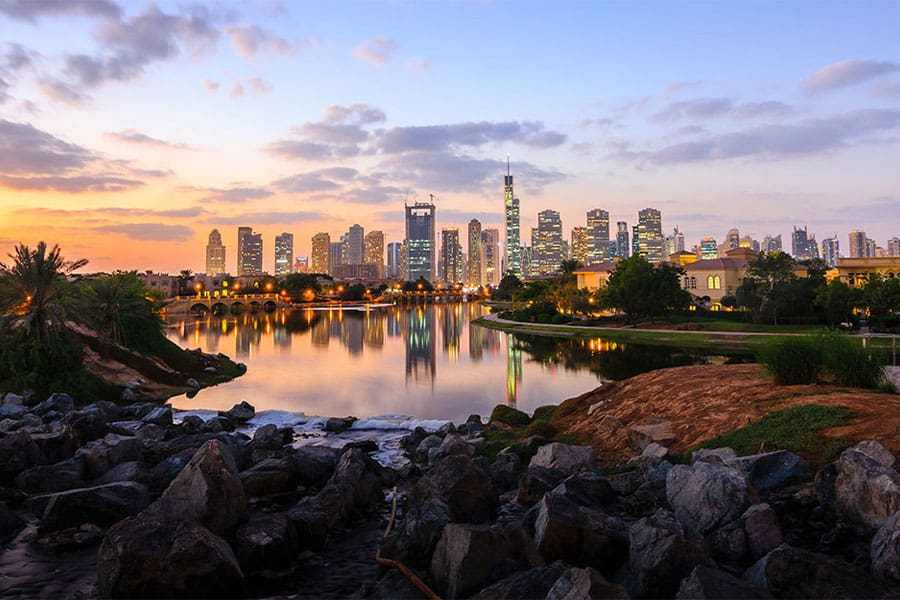
For individuals: Hold properties personally to avoid corporate taxes, saving $6,120-$36,000. Negotiate DLD fee splits, saving $12,000-$100,000. Use gift transfers to reduce DLD to 0.125%, saving $23,250-$193,750. Recover 5% VAT on developer fees via FTA registration ($500-$1,000). Leverage double taxation treaties with 130+ countries, saving $13,320-$67,500. U.S. investors deduct depreciation ($10,909-$90,909), saving up to $31,818. For corporates: Secure QFZP status, keep QIF income below 10%, and claim depreciation deductions. Hire property managers ($8,000-$25,000 annually) and tax professionals ($1,000-$3,000) to avoid fines up to $136,125. Focus on short-term rentals in Bluewaters, long-term in Palm Jumeirah.
These strategies feel like a roadmap to your luxurious wealth.
Risks to Watch in 2025
A projected oversupply of 182,000 units by 2026 may slightly slow price growth in newer areas, but established locations like Palm Jumeirah and Emirates Hills remain resilient. Off-plan delays risk setbacks, so choose trusted developers like Emaar or Nakheel and verify escrow compliance via the 2025 Oqood system. Non-compliance with VAT or DTCM rules risks fines up to $13,612, and corporate tax errors can cost $136,125. Indian investors must report properties in India’s Foreign Asset schedule to avoid $135,000 penalties. Currency fluctuations, like a 5% dirham shift, could impact returns.
Why Dubai Is Worth It for Luxury Owners
From Palm Jumeirah’s beachfront villas to Emirates Hills’ regal estates, Dubai’s luxury properties offer 8-12% ROI, 7-15% growth, and tax-free savings of $6,000-$300,000 annually. With Golden Visa perks, 80-85% rental occupancy, and a lifestyle of grandeur, Dubai remains a top destination. Navigate fees, choose your property, and invest in Dubai’s opulent future in 2025.
read more: Dubai Hills Estate: Lifestyle, Green Living, and Strong ROI



